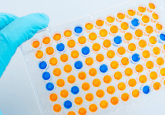Anti-nephrin autoantibodies as novel biomarkers for kidney diseases associated with nephrotic syndrome

An innovative study, presented at the 61st European Renal Association (ERA) Congress (May 23–26 2024; Stockholm, Sweden), displays a new hybrid technique that identifies anti-nephrin autoantibodies as an effective biomarker for monitoring kidney disease progression, opening new doors for personalized treatments.
Nephrotic syndrome, marked by elevated protein levels in urine, is associated with kidney diseases such as minimal change disease (MCD), primary focal segmental glomerulosclerosis (FSGS) and membranous nephropathy (MN). The main etiology of nephrotic syndrome is damage to podocytes, the cells responsible for filtering in the kidneys, leading to protein leakage, including the podocyte protein nephrin, into the urine.
Children diagnosed with MCD or FSGS are often classified under idiopathic nephrotic syndrome (INS), where the etiology of the condition is unknown. This is largely because children with high protein levels in their urine rarely undergo a kidney biopsy, the standard procedure for determining the underlying cause of the disease.
Diagnosing both MCD and FSGS has been challenging due to overlapping histological features and reluctance to perform invasive kidney biopsies, especially in children. Although anti-nephrin autoantibodies have been detected in some patients with MCD and FSGS, their exact role in the progression of these diseases has previously remained unclear.
You may also be interested in:
- Discovery technologies for the multi-omics era of precision medicine: an interview with Dr Mo Jain
- Infographic: The Essentials of Sample Preparation
- Western blotting: evolution of an old analytical method to a new quantitative tool for biomarker measurements
The newly reported study conducted across Europe and the US now introduces an innovative approach that combines both immunoprecipitation with enzyme-linked immunosorbent assay (ELISA) to consistently detect anti-nephrin autoantibodies. Their findings showed that anti-nephrin autoantibodies were present in 69% of adults with MCD and 90% of children with INS who had not received immunosuppressive treatment. Notably, the levels of these autoantibodies correlated directly with disease activity, indicating their promise as biomarkers for monitoring kidney disease progression.
To further explore the effects of nephrin immunization, the research team administered laboratory-designed nephrin protein to mice and induced a condition similar to MCD within the mice. This immunization led to the phosphorylation of nephrin and caused significant changes in cell structure. This suggests that antibodies targeting nephrin contribute to podocyte breakdown and consequent nephrotic syndrome. Interestingly, in contrast to other models requiring multiple immunizations, this new model caused rapid disease onset with only a single immunization, even at levels of low antibody concentrations.
Nicola Tomas, co-lead author of the study, remarked, “The identification of anti-nephrin autoantibodies as a reliable biomarker, coupled with our hybrid immunoprecipitation technique, enhances our diagnostic capabilities and opens new avenues for closely monitoring disease progression in kidney disorders with nephrotic syndrome.”
Tobias Huber, lead author of the study, added, “By providing insights into underlying mechanisms, these findings lay the groundwork for personalized interventions and pave the way for a new era of precision medicine for these complex conditions.”


